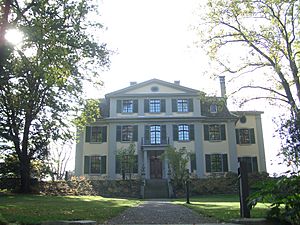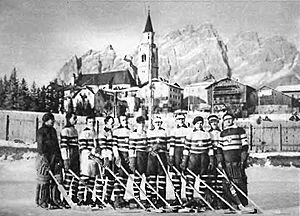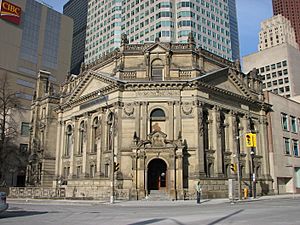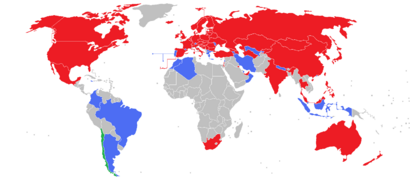International Ice Hockey Federation facts for kids
 |
|
| Abbreviation | IIHF |
|---|---|
| Formation | 15 May 1908 |
| Founded at | Paris, France |
| Type | Sports federation |
| Legal status | Governing body of ice hockey |
| Purpose | Sport governance |
| Headquarters | Zurich, Switzerland |
|
Region served
|
Worldwide |
|
Membership
|
84 members |
|
Official languages
|
English, French, German |
|
President
|
Luc Tardif |
The International Ice Hockey Federation (IIHF) is the main organization for ice hockey around the world. It is based in Zurich, Switzerland. The IIHF has 84 member countries that play ice hockey.
The IIHF creates the IIHF World Ranking. This ranking shows how well countries' ice hockey teams are doing. The rules for IIHF games are different from those used in North America or the National Hockey League (NHL). If there's a disagreement about an IIHF decision, it can be taken to the Court of Arbitration for Sport. The IIHF also has its own Hall of Fame. The IIHF Hall of Fame started in 1997. Since 1998, it has been part of the Hockey Hall of Fame in Toronto.
The IIHF used to manage inline hockey. But in June 2019, they stopped being in charge of it. They also stopped organizing the Inline Hockey World Championships.
Contents
What the IIHF Does
The main jobs of the IIHF are to lead, grow, and organize ice hockey everywhere. They also help create good relationships between member countries. The IIHF makes sure the sport is run in an organized way.
The federation can take steps to follow its own rules and laws. It has clear authority over international ice hockey. The IIHF is also in charge of getting sponsors. They manage license rights, advertising, and merchandise for all IIHF events.
Another goal of the IIHF is to help young players get better. They also help train coaches and game officials. The IIHF organizes all its events. It also works with other sports groups. The IIHF handles international player transfers. It is also in charge of ice hockey at the Olympic Games. They also oversee all levels of the IIHF World Championships. The federation works with local groups to organize its 25 World Championships. These championships are held in five different categories.
The IIHF also organizes European club competitions. Examples are the Champions Hockey League and the Continental Cup.
The IIHF is run by two main groups. The General Congress makes the big decisions. The Council is the executive group that carries out these decisions. The Congress decides on game rules and laws. It also elects the president and the Council. The IIHF president represents the federation. The president makes sure decisions follow the rules. The General Secretary helps the president. This person is the highest-ranking employee of the IIHF.
History of the IIHF
The International Ice Hockey Federation started on May 15, 1908. It was founded in Paris, France. Its first name was Ligue Internationale de Hockey sur Glace (LIHG). Ice hockey was first included in the 1920 Olympics.
The 1928 Winter Olympics had a record 11 countries playing. This event was also the World and European Championship that year.
In 1957, some countries boycotted the World Championships. These championships were held in Moscow. Canada and the United States led this boycott. They were joined by Norway, West Germany, Italy, and Switzerland. This happened because of political events in Hungary.
The 1962 World Championship was held in American cities. The Soviet Union and Czechoslovakia boycotted it. Other Eastern Bloc countries also joined the boycott. This was partly because of the 1957 boycott. It was also because the Americans did not accept East German passports. This was due to the building of the Berlin Wall.
For the 1965–66 season, the IIHF started the European Cup. This tournament was for the best club teams in Europe. It was inspired by the European Cup in Association football. In 1968, the IIHF created the European U19 Championship. This was for players aged 19 and under. The age limit was later changed to 18 in 1977.
During the 1980s, Canada stopped boycotting the World Championships and Olympic Games. Canada had boycotted these events from 1970 to 1976. This was because the IIHF did not allow professional players from NHL teams to play. President Günther Sabetzki found a solution. Canada returned to international events in 1977. Professional players whose teams were out of the playoffs could now compete. In return, Canada agreed to play in the World Championships. They also gave up their right to host any World Championships. The Canada Cup was also created as part of this new agreement. This competition was organized by the NHL every four years.
The IIHF continued to grow in the 1980s and 1990s. This was due to political changes and hockey's growth. When the Soviet Union broke up, Russia took its place. Four new countries joined: Azerbaijan, Belarus, Kazakhstan, and Ukraine. Estonia, Latvia, and Lithuania also rejoined. They had been members in the 1930s but were removed earlier. The breakup of Yugoslavia also added new members. Croatia and Slovenia joined. The old Yugoslavia's membership went to Serbia and Montenegro. When Czechoslovakia split, the Czech Republic took its place. Slovakia joined as a new member. More members meant the IIHF Group A tournament got bigger. It went from 8 teams to 12 in 1992. Then it grew from 12 to 16 teams in 1998.
The IIHF celebrated its 100th birthday in 2008. The 2008 World Championship was held in Canada for the first time. It was co-hosted by Halifax and Quebec City.
More countries joined the IIHF in the 21st century. These included Chile (2000), Bosnia and Herzegovina (2001), and the United Arab Emirates (2001). Many other countries joined too, like Malaysia (2006), Georgia (2009), Morocco (2010), Jamaica (2012), and the Philippines (2016). Recently, Tunisia (2021), Puerto Rico (2022), Bahrain (2024), and Kenya (2024) also became members.
The IIHF faced criticism for holding the 2014 Men's Ice Hockey World Championships in Belarus. This was due to concerns about the country's situation. Several groups asked for a boycott. There were also appeals from the US Congress and the European Parliament.
The IIHF again faced criticism for planning to hold part of the 2021 Men's Ice Hockey World Championships in Belarus. In January 2021, the IIHF moved the 2021 World Championship from Minsk. This was due to safety and security issues. The tournament was then held only in Riga, Latvia.
On May 23, 2021, an incident happened involving an airplane in Minsk. In protest, Latvian officials changed the Belarusian state flag in Riga. They used a different flag linked to opposition groups. This included the flag display at the 2021 IIHF World Championship. The IIHF said they were against this. IIHF president René Fasel asked for the IIHF name and symbols to be removed. He said the IIHF is a "sports organization" and not involved in politics. The mayor of Riga agreed to remove the IIHF flags.
On February 28, 2022, the IIHF stopped the memberships of Russia and Belarus. This was because of the countries' actions in Ukraine. Their memberships are suspended until further notice.
Even with the suspension, non-Russian players in Russian clubs are still bound by their contracts. They cannot leave their clubs or Russia until their contracts end. If players leave, they could face legal action. They might also be stopped from playing for other clubs.
On March 22, 2023, the IIHF excluded Russian and Belarusian teams from competitions. This was for the 2023–24 season. The decision was made for safety reasons.
Awards and Honors
The IIHF gives out awards every year. The awards ceremony is on the second-to-last day of the World Championship. The Hall of Fame induction ceremony is on the last day. Before 2024, all awards were given at one ceremony.
IIHF Hall of Fame
Before the IIHF Hall of Fame started, the IIHF showed old hockey items in temporary displays. From 1992 to 1997, the IIHF loaned its items to the International Hockey Hall of Fame in Kingston, Canada.
The IIHF decided to create its own Hall of Fame in 1996. It was approved in 1997. The goal was to honor great international ice hockey players, builders (people who helped the sport grow), and officials. The induction ceremony happens during the World Championships. The IIHF agreed to move its exhibits to the Hockey Hall of Fame in Toronto. This happened on July 29, 1998.
In 2015, the IIHF created the Torriani Award. This award is for "players with an amazing career from countries not known for top hockey." It was named after Bibi Torriani, a player from Switzerland. The IIHF includes Torriani Award winners in the Hall of Fame list.
Paul Loicq Award
The Paul Loicq Award started in 1998. It is given every year to someone who has made "great contributions to the IIHF and international ice hockey." It is named after Paul Loicq, who was IIHF president from 1922 to 1947. This is the highest personal award from the IIHF.
Centennial All-Star Team
The IIHF Centennial All-Star Team is a special group of hockey players. They were chosen from international tournaments. The team was picked based on how much they impacted international hockey for at least ten years. They had to play at the highest level, like the Olympics or World Championships. This team was named in 2008. All six players were already in the IIHF Hall of Fame.
Milestone Award
The Milestone Award started in 2012. It is given to teams that have made a big difference in international hockey. Or to teams that have greatly influenced the game's development. The IIHF wanted an award to recognize important events, teams, or moments. They asked hockey fans for ideas to rename it. The award is given sometimes, not every year. It was not given between 2013 and 2024.
| Year | Recipient(s) | Milestone accomplishment(s) |
|---|---|---|
| 2012 | 1972 Canada men's national team 1972 Soviet Union men's national team |
Awarded for the 40th anniversary of the 1972 Summit Series. This series was between Canada and the Soviet Union. Many thought Canada would win easily. But when Canada won the last game, it started the "modern hockey era." |
| 2013 | 1954 Soviet Union men's national team | Awarded for winning the gold medal at the 1954 Ice Hockey World Championships. This was their country's first time at the World Championships. It also started a big rivalry with the Canada men's national team. |
| 2024 | 1998 Czech Republic men's national team | Awarded for winning the gold medal in ice hockey at the 1998 Winter Olympics. They beat Canada in the semifinal and Russia in the finals. The 1998 Olympics was the first to include National Hockey League players. The IIHF said this gold medal was "the most important event in the country's history" after the 1968 Uprising. |
| 2025 | 2002–03 Denmark men's national teams | Awarded for moving up to the World Championships top level. This happened after 53 years in lower divisions. Denmark won Division I-B in 2002. They have stayed at the top level since then. |
| 2025 | 2006 Sweden men's national team | Awarded for being the first men's team to win an Olympic gold medal and the World Championships in the same year. Sweden won gold at both the 2006 Winter Olympics and the 2006 IIHF World Championship. Eight players were on both winning teams. |
All-Time Teams
The IIHF chose all-time teams for 16 countries. These countries would have played in the 2020 IIHF World Championship. This was to celebrate 100 years of the Ice Hockey World Championships.
Player of the Year Awards
The IIHF started male and female player of the year awards in 2023. These awards are given every year. They honor players who show great skill, determination, and good sportsmanship. A group of media and IIHF members chooses the winners. To be eligible, a player must have played in at least one of four IIHF tournaments. These include the Winter Olympics and World Championships. They also must have played in a top national league. Their combined performance must be better than all other players.
Johan Bollue Award
The Johan Bollue Award started in 2023. It is named after Johan Bollue (1964–2021). He helped develop sports for the Royal Belgian Ice Hockey Federation. He also organized Youth Olympic Games and mentored coaches. This award is given to a person or group. It recognizes their big help in growing youth ice hockey. Markus Graf received the award in 2024. Jim Aldred will receive it in 2025.
Media Award
The IIHF Media Award started in 2024. It is given to someone who has greatly helped international hockey. This includes work in television, print, and radio. The first winner was Al Michaels. He famously called the "Miracle on Ice" victory by the United States men's national team in the 1980 Winter Olympics. In 2025, Paul Graham was recognized for covering IIHF events.
IIHF Tournaments
Men's Tournaments
| Tournament | Year | Champions | Runners-up | Third place | Fourth place |
|---|---|---|---|---|---|
| Winter Olympics | |||||
| IIHF World Championship | |||||
| U-20 IIHF World Championship | |||||
| U-18 IIHF World Championship |
Women's Tournaments
| Tournament | Year | Champions | Runners-up | Third place | Fourth place |
|---|---|---|---|---|---|
| Winter Olympics | |||||
| IIHF Women's World Championship | |||||
| U-18 IIHF Women's World Championship |
Club Tournaments
| Tournament | Year | Champions | Runners-up | Third place | Fourth place |
|---|---|---|---|---|---|
| Champions Hockey League | 2024–25 | ||||
| IIHF Continental Cup | 2024–25 | ||||
Developmental Tournaments
Since 2017, the IIHF has approved the IIHF Development Cup. This is for men's and women's teams that are still developing. These teams do not qualify for the main IIHF World Championships.
| Tournament | Year | Gender | Champions | Runners-up | Third place |
|---|---|---|---|---|---|
| IIHF Development Cup | 2025 | Men | |||
| 2023 | Women |
IIHF Leaders
The IIHF has about twenty staff members at its main office in Zurich.
Presidents of the IIHF
| Name | Years |
|---|---|
| 1908–1912 | |
| 1912–1914 | |
| 1914 | |
| 1914 | |
| 1914–1920 | |
| 1920–1922 | |
| 1922–1947 | |
| 1947–1948 | |
| 1948–1951 | |
| 1951–1954 | |
| 1954–1957 | |
| 1957–1960 | |
| 1960–1963 | |
| 1963–1966 | |
| 1966–1969 | |
| 1969–1975 | |
| 1975–1994 | |
| 1994–2021 | |
| 2021–present |
Chief Medical Officers
- Wolf-Dieter Montag, Germany (1975 to 1998)
- Mark Aubry, Canada (1998 to present)
IIHF Member Countries
As of September 28, 2024, the IIHF has 84 member countries.
There are 60 full members. This includes two suspended members. Full members have a national organization just for ice hockey. They play in the international championships every year. Only full members can vote.
There are also 23 associate members and 1 affiliate member. These countries might not have a national hockey body. Or they might not play in international championships regularly.
Members by Division
Men's Divisions
Here are the countries playing in the 2025 Men's Ice Hockey World Championships. They are grouped by their skill level:
| Division | IIHF members |
|---|---|
| Top | |
| I | |
| II | |
| III | |
| IV |
Men's U20 Divisions
Here are the countries playing in the 2025 World Junior Ice Hockey Championships. They are grouped by their skill level:
| Division | IIHF members |
|---|---|
| Top | |
| I | |
| II | |
| III |
Women's Divisions
Here are the countries playing in the 2024 Women's Ice Hockey World Championships. They are grouped by their skill level:
| Division | IIHF members |
|---|---|
| Top | |
| I | |
| II | |
| III |
Registered Players by Country
This list shows how many ice hockey players are registered in each country. It includes male, female, and junior players. The numbers are from October 2022. This list includes 71 of the 84 IIHF member countries.
| Country | Registered players | % of registered players | % of population |
|---|---|---|---|
| 551,006 | 35.44% | 0.166% | |
| 513,674 | 33.04% | 1.361% | |
| 103,101 | 6.63% | 0.071% | |
| 66,687 | 4.29% | 1.204% | |
| 61,547 | 3.96% | 0.609% | |
| 34,341 | 2.21% | 0.321% | |
| 29,360 | 1.89% | 0.339% | |
| 21,090 | 1.36% | 0.025% | |
| 18,686 | 1.20% | 0.029% | |
| 16,219 | 1.04% | 0.013% | |
| 13,388 | 0.86% | 0.001% | |
| 13,327 | 0.86% | 0.020% | |
| 11,447 | 0.74% | 0.210% | |
| 8,943 | 0.58% | 0.093% | |
| 8,618 | 0.55% | 0.159% | |
| 7,898 | 0.51% | 0.419% | |
| 7,232 | 0.47% | 0.080% | |
| 7,053 | 0.45% | 0.075% | |
| 6,150 | 0.40% | 0.024% | |
| 5,341 | 0.34% | 0.012% | |
| 5,147 | 0.33% | 0.089% | |
| 5,136 | 0.33% | 0.008% | |
| 4,320 | 0.28% | 0.023% | |
| 3,950 | 0.25% | 0.010% | |
| 3,515 | 0.23% | 0.021% | |
| 3,044 | 0.20% | 0.006% | |
| 2,702 | 0.17% | 0.041% | |
| 2,213 | 0.14% | 0.012% | |
| 2,035 | 0.13% | 0.042% | |
| 1,793 | 0.12% | 0.015% | |
| 1,700 | 0.11% | 0.007% | |
| 1,502 | 0.10% | 0.000% | |
| 1,486 | 0.10% | 0.002% | |
| 1,340 | 0.09% | 0.049% | |
| 1,232 | 0.08% | 0.001% | |
| 1,072 | 0.07% | 0.052% | |
| 995 | 0.06% | 0.075% | |
| 980 | 0.06% | 0.002% | |
| 945 | 0.06% | 0.014% | |
| 893 | 0.06% | 0.002% | |
| 868 | 0.06% | 0.004% | |
| 828 | 0.05% | 0.025% | |
| 752 | 0.05% | 0.220% | |
| 695 | 0.04% | 0.007% | |
| 668 | 0.04% | 0.008% | |
| 624 | 0.04% | 0.001% | |
| 598 | 0.04% | 0.015% | |
| 576 | 0.04% | 0.008% | |
| 520 | 0.03% | 0.013% | |
| 508 | 0.03% | 0.006% | |
| 492 | 0.03% | 0.079% | |
| 480 | 0.03% | 0.001% | |
| 421 | 0.03% | 0.001% | |
| 402 | 0.03% | 0.009% | |
| 350 | 0.02% | 0.007% | |
| 347 | 0.02% | 0.006% | |
| 269 | 0.02% | 0.003% | |
| 250 | 0.02% | 0.001% | |
| 242 | 0.02% | 0.007% | |
| 233 | 0.01% | 0.000% | |
| 225 | 0.01% | 0.001% | |
| 220 | 0.01% | 0.004% | |
| 208 | 0.01% | 0.003% | |
| 205 | 0.01% | 0.007% | |
| 187 | 0.01% | 0.006% | |
| 185 | 0.01% | 0.000% | |
| 165 | 0.01% | 0.006% | |
| 139 | 0.01% | 0.000% | |
| 121 | 0.01% | 0.019% | |
| 110 | 0.01% | 0.000% | |
| 110 | 0.01% | 0.000% |
IIHF World Ranking
The IIHF World Ranking shows how good countries' national teams are over time. This ranking is updated after each IIHF Ice Hockey World Championship and the Olympic Ice Hockey Tournament.
See also
 In Spanish: Federación Internacional de Hockey sobre Hielo para niños
In Spanish: Federación Internacional de Hockey sobre Hielo para niños





